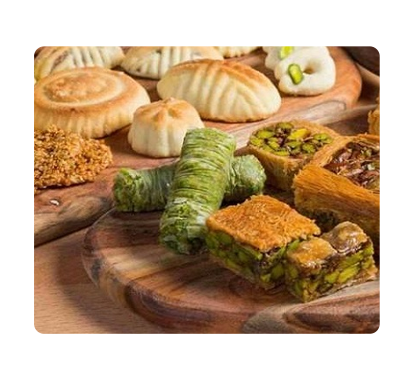It is about establishing a confectionery factory that produces Kunafa, Baklava, Basbousa and other sweets. These sweets have a large market share in the local market. The proposed project is considered one of the projects that complement the food system and the product is one of the consumer products that are directly linked to the consumer, his tendencies and tastes, which are increasingly accepted throughout the year and increase during seasons and occasions.

It is the establishment of a confectionery factory that manufactures kunafa, baklava, basbousa and other sweets. As it takes a major marketing segment in the local market, the proposed project is considered one of the projects that complement the food system and the product is one of the consumer products that are directly related to the consumer and his tendencies and tastes, which are increasingly accepted throughout the year and increase in seasons and occasions. The confectionery factory is characterized by its use of the best ingredients in packaging and packaging and the use of aesthetically shaped packages. The project is characterized by using the best ingredients in packaging and packaging and using aesthetically shaped packages. The project is one of the projects that do not need relatively high capital when compared to other projects, and it is also characterized by rapid profitability and short payback period.



Outstanding quality for all products.
Diverse display.
Strict and continuous cleanliness of the place, inventory, and staff.
Carefully selected raw materials.
Products are packaged with the finest, attractive packaging materials.
Executive summary
Study project services/products
Market Size Analysis
Risk Assessment
Technical study
Financial study
Organizational and administrative study

Service sector in GCC countries
According to the macroeconomic theory of sectors, the economy is divided into three main and large sectors: the first; – is the sector that is based on collecting raw materials and includes mining companies, timber companies, oil exploration companies, in addition to agricultural and fishing industries. The second sector; is the sector that depends on goods and their sale, such as: (car manufacturing, furniture, clothing trade… etc.). As for the third sector, known as the “services” sector; it is the sector responsible for providing and producing services, essentially relying on intangible things, such as: entertainment, health care, transportation, hospitality, restaurants, etc. This theory believes that the more advanced countries are, the more their economies are based on the third sector, unlike primitive countries, which rely mostly on the first sector (the United States of America, for example, the service sector constitutes 85% of its economy).
Kingdom of Saudi Arabia:
The State of Qatar:
Kuwait:
United Arab Emirates:
Sultanate of Oman:
Global Service Sector
The service sector is the major contributor to the world’s gross product; It alone accounts for more than three fifths of this output. The sector does not rely on the production of tangible goods such as automobile and furniture, but rather on the provision of intangible services such as banking, medical care, transportation, hospitality, leisure, etc. The value of the sector market was estimated in 2020 at USD 10,814.49 billion and rose to USD 11,780.11 billion in 2021. The market achieved a CAGR of 8.9%. After recovering from the effects of the coronavirus pandemic, global market experts expect the sector’s market to reach US $ 15683.84 billion by 2025, bringing the market to a CAGR of 7% in the coming years.
